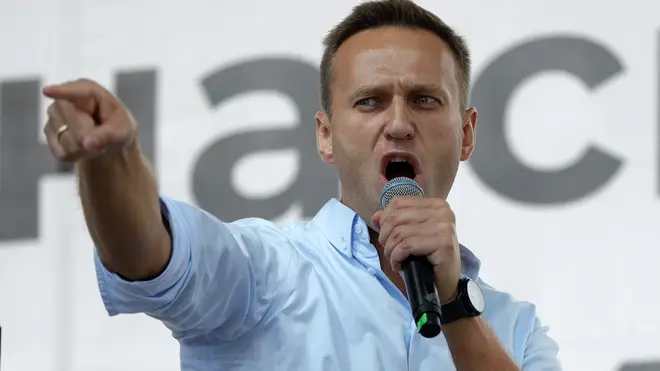
Tom Swarbrick 4pm - 7pm
21 December 2020, 17:14

Alexei Navalny fell sick on August 20 during a domestic flight in Russia and was flown to Berlin while still in a coma for treatment two days later.
Russian opposition leader Alexei Navalny has released a recording of a phone call he said he made to an alleged state security operative who revealed details of how the politician was supposedly poisoned.
Mr Navalny fell sick on August 20 during a domestic flight in Russia and was flown to Berlin while still in a coma for treatment two days later.
Labs in Germany, France and Sweden, and tests by the Organisation for the Prohibition of Chemical Weapons, established that he was exposed to a Soviet-era Novichok nerve agent.
Russian authorities have vehemently denied any involvement in the poisoning.

Last week, the investigative group Bellingcat released a report alleging that operatives from Russia’s FSB domestic security agency with “specialised training in chemical weapons, chemistry and medicine” were “in the vicinity” of Mr Navalny in the time frame “during which he was poisoned”.
The investigation, conducted by Bellingcat and Russian news outlet The Insider in co-operation with CNN and German news outlet Der Spiegel, identified the supposed FSB operatives after analysing telephone metadata and flight information.
Mr Navalny, who is convalescing in Germany, said the report proved beyond doubt that FSB operatives tried to kill him on the orders of Russian President Vladimir Putin.
On Monday, he posted a video on his YouTube channel titled “I called my killer. He confessed”.
The video showed him speaking on the phone with one of the alleged operatives.
Bellingcat and other media outlets identified the man Mr Navalny said he spoke to as Konstantin Kudryavtsev, a trained chemical weapons specialist.
The investigation alleged that Mr Kudryavtsev travelled to Omsk – the Siberian city where the plane carrying Mr Navalny when he became ill made an emergency landing and where the comatose politician was first admitted to hospital – several days after Mr Navalny was airlifted to Berlin.

Mr Navalny said he phoned the alleged FSB operative hours before the Bellingcat report was released, introduced himself as an aide to Russian Security Council secretary Nikolai Patrushev and said he urgently needed to debrief the man on what had happened in another Siberian city, Tomsk, where the politician had been before he was supposedly poisoned.
The man on the other end of the call indicated that he was involved in the “processing” of Mr Navalny’s clothes so “there wouldn’t be any traces”.
The clothes Mr Navalny was wearing when he was admitted to hospital in a coma have not been returned to him.
While posing as a Security Council aide, the politician asked “what went wrong” and why Mr Navalny survived the poisoning.
The man on the other end replied “it would have all gone differently” if the plane had not made the emergency landing and “if (it had) not (been) for the prompt work of the ambulance medics on the runway”.
The man also reported that among Mr Navalny’s clothing, his underwear bore the highest concentration of toxic residue.
The Associated Press was not able to independently verify the identity of the man with whom Mr Navalny spoke in the video.
Russian authorities have not yet commented on the recording, which received more than 1.4 million views on YouTube within hours of being posted.
Earlier this month, Russian officials brushed off the investigation by Bellingcat and other media outlets.
Mr Putin claimed last week that the investigation relied on data provided by US spy agencies.
Its authors have denied any link to US or any other Western intelligence services.
“It’s not some kind of investigation, it’s just the legalisation of materials provided by US special services,” the Russian leader alleged during his annual press conference.
He said that means Mr Navalny “relies on the support of US special services”.
“It’s curious, and in that case, special services indeed need to keep an eye on him,” Mr Putin said.
“But that doesn’t mean that there is a need to poison him. Who would need that?”